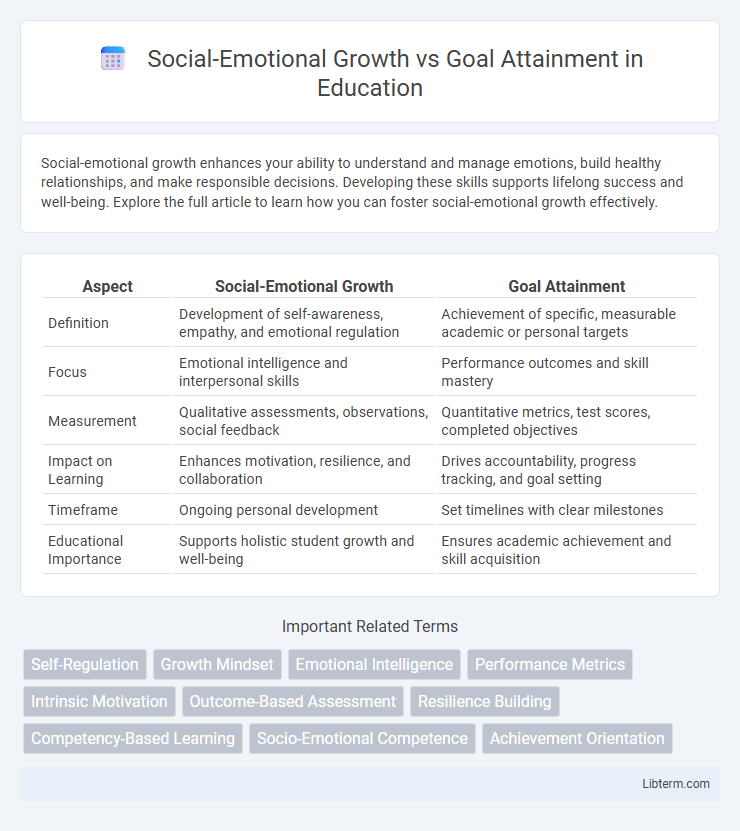Social-emotional growth enhances your ability to understand and manage emotions, build healthy relationships, and make responsible decisions. Developing these skills supports lifelong success and well-being. Explore the full article to learn how you can foster social-emotional growth effectively.
Table of Comparison
| Aspect | Social-Emotional Growth | Goal Attainment |
|---|---|---|
| Definition | Development of self-awareness, empathy, and emotional regulation | Achievement of specific, measurable academic or personal targets |
| Focus | Emotional intelligence and interpersonal skills | Performance outcomes and skill mastery |
| Measurement | Qualitative assessments, observations, social feedback | Quantitative metrics, test scores, completed objectives |
| Impact on Learning | Enhances motivation, resilience, and collaboration | Drives accountability, progress tracking, and goal setting |
| Timeframe | Ongoing personal development | Set timelines with clear milestones |
| Educational Importance | Supports holistic student growth and well-being | Ensures academic achievement and skill acquisition |
Understanding Social-Emotional Growth
Understanding social-emotional growth involves recognizing the development of skills such as self-awareness, emotional regulation, empathy, and interpersonal communication. These competencies are foundational for building resilience and fostering positive relationships, which contribute significantly to overall well-being and effective collaboration. Emphasizing social-emotional growth can enhance motivation and adaptability, complementing goal attainment by promoting sustained personal and professional success.
Defining Goal Attainment in Personal Development
Goal attainment in personal development refers to the process of setting, pursuing, and achieving specific objectives that contribute to an individual's growth and self-improvement. It involves measurable progress toward defined targets such as career advancement, skill acquisition, or habit formation. This structured approach contrasts with social-emotional growth, which focuses more on developing emotional intelligence, interpersonal skills, and self-awareness to enhance overall well-being.
The Interplay Between Emotions and Achievement
Social-emotional growth significantly influences goal attainment by shaping motivation, resilience, and decision-making processes critical for success. Emotional regulation and self-awareness enable individuals to navigate challenges and maintain focus on objectives, enhancing performance outcomes. The dynamic interplay between emotions and achievement underscores the importance of cultivating emotional intelligence to drive sustained academic and professional growth.
Social-Emotional Skills: Foundation for Success
Social-emotional skills such as self-awareness, empathy, and emotional regulation create a crucial foundation for both personal and professional success. These competencies enable individuals to build meaningful relationships, navigate challenges, and maintain motivation, which directly supports effective goal attainment. Investing in social-emotional growth enhances resilience and adaptability, key drivers of sustained achievement across various domains.
Goal Setting: Balancing Ambition and Wellbeing
Effective goal setting requires balancing ambition with social-emotional growth to ensure sustainable success and wellbeing. Prioritizing self-awareness, emotional regulation, and interpersonal skills alongside goal attainment fosters resilience and motivation. Integrating mindfulness and realistic expectations supports a healthy pursuit of achievement without compromising mental health.
Benefits of Prioritizing Emotional Intelligence
Prioritizing emotional intelligence fosters stronger interpersonal relationships, enhancing collaboration and communication within teams. This growth in social-emotional skills supports resilience and adaptability, which are crucial for sustained success beyond mere goal attainment. Emphasizing emotional intelligence encourages self-awareness and empathy, leading to improved decision-making and long-term professional development.
Challenges of Focusing Only on Goals
Focusing exclusively on goal attainment often neglects critical aspects of social-emotional growth, such as self-awareness, empathy, and resilience, which are essential for long-term success and well-being. This narrow approach can lead to increased stress, burnout, and reduced motivation, as individuals may struggle to manage interpersonal relationships and emotional regulation effectively. Research highlights that integrating social-emotional learning with goal-setting enhances overall performance and fosters adaptive coping strategies in challenging environments.
Integrating Growth Mindset with Goal Pursuit
Integrating a growth mindset with goal pursuit enhances social-emotional growth by fostering resilience, adaptability, and intrinsic motivation. Emphasizing effort and learning from setbacks encourages positive self-perception and emotional regulation, crucial for sustained goal attainment. This approach supports a dynamic interplay between personal development and strategic achievement, optimizing both emotional well-being and performance outcomes.
Measuring Social-Emotional Growth vs Goal Progress
Measuring social-emotional growth involves assessing emotional intelligence, self-regulation, empathy, and interpersonal skills through qualitative tools like observations, reflective journals, and peer feedback. In contrast, goal progress is typically quantified using specific, measurable criteria, milestones, and performance metrics that track objective achievement over time. Combining these approaches provides a comprehensive view of development by integrating subjective well-being with tangible outcomes.
Strategies for Harmonizing Growth and Achievement
Integrating social-emotional growth with goal attainment requires strategies that foster emotional intelligence alongside measurable progress, such as setting personalized objectives that align with individual values and emotional strengths. Emphasizing reflective practices and regular feedback supports self-awareness and resilience, enhancing both personal development and achievement outcomes. Tailored coaching and collaborative goal-setting sessions create an environment where emotional well-being and performance metrics advance in concert for sustained success.
Social-Emotional Growth Infographic

 libterm.com
libterm.com